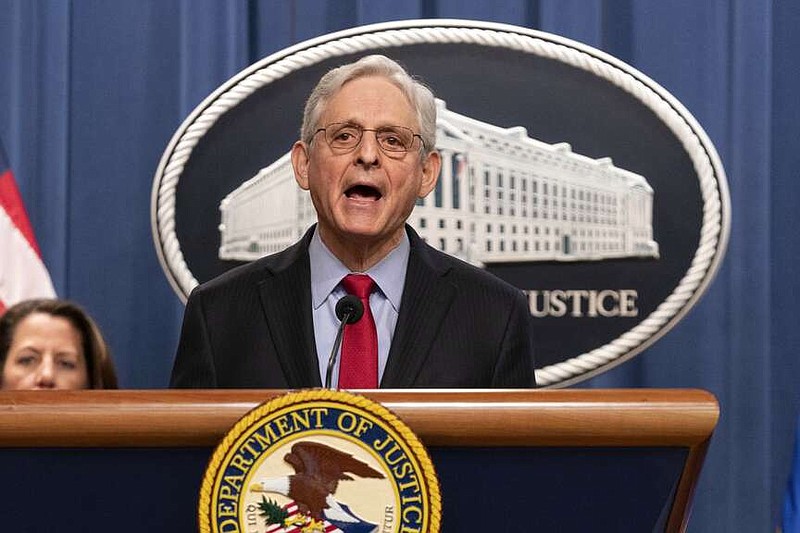WASHINGTON -- The Justice Department on Thursday announced a sweeping antitrust lawsuit against Apple Inc., accusing the tech giant of engineering an illegal monopoly in smartphones that boxes out competitors, stifles innovation and keeps prices artificially high.
The lawsuit, filed in federal court in New Jersey, alleges that Apple has monopoly power in the smartphone market and leverages control over the iPhone to "engage in a broad, sustained, and illegal course of conduct."
"Apple has locked its consumers into the iPhone while locking its competitors out of the market," said Deputy Attorney General Lisa Monaco. Stalling the advancement of the very market it revolutionized, she said, it has "smothered an entire industry."
Apple called the lawsuit "wrong on the facts and the law" and said it "will vigorously defend against it."
The action takes aim at how Apple molds its technology and business relationships to "extract more money from consumers, developers, content creators, artists, publishers, small businesses, and merchants, among others."
That includes diminishing the functionality of non-Apple smartwatches, limiting access to contactless payment for third-party digital wallets and refusing to allow its iMessage app to exchange encrypted messaging with competing platforms.
It specifically seeks to stop Apple from undermining technologies that compete with its own apps -- in areas including streaming, messaging and digital payments -- and prevent it from continuing to craft contracts with developers, accessory makers and consumers that let it "obtain, maintain, extend or entrench a monopoly."
The lawsuit -- filed with 16 attorneys general -- is just the latest example of aggressive antitrust law enforcement by a Justice Department that has also taken on Amazon, Google and other tech giants with the stated aim of making the digital universe more fair, innovative and competitive. Connecticut, Arizona, California, the District of Columbia, Maine, Michigan, Minnesota, New Hampshire, New Jersey, New York, North Dakota, Oklahoma, Oregon, Tennessee, Vermont and Wisconsin joined the complaint.
"The Department of Justice has an enduring legacy taking on the biggest and toughest monopolies in history," said Assistant Attorney General Jonathan Kanter, head of the antitrust division, at a news conference announcing the lawsuit.
"Today we stand here once again to promote competition and innovation for next generation of technology."
Antitrust researcher Dina Srinavasan, a Yale University fellow, compared the lawsuit's significance to the government's action against Microsoft a quarter century ago -- in picking a "tremendous fight" with what has been the world's most prosperous company.
"It's a really big deal to go up and punch someone who is acting like a bully and pretending not to be a bully," she said.
President Joe Biden has called for the Justice Department and the Federal Trade Commission to vigorously enforce antitrust statutes.
Its stepped-up policing of corporate mergers and questionable business practices has met resistance from some business leaders -- who accuse the Democratic administration of overreach -- but it has been lauded by others as long overdue.
The case seeks to pierce the digital fortress that Apple Inc., based in Cupertino, Calif., has assiduously built around the iPhone and other popular products such as the iPad, Mac and Apple Watch to create what is often referred to as a "walled garden" so its meticulously designed hardware and software can seamlessly flourish together while requiring consumers to do little more than turn the devices on.
The strategy has helped Apple attain annual revenue of nearly $400 billion and, until recently, a market value of more than $3 trillion.
But Apple's shares have fallen by 7% this year even as most of the stock market has climbed to new highs, resulting in longtime rival Microsoft seizing the mantle as the world's most valuable company.
Apple said the lawsuit, if successful, would "hinder our ability to create the kind of technology people expect from Apple -- where hardware, software, and services intersect" and would "set a dangerous precedent, empowering government to take a heavy hand in designing people's technology."
"At Apple, we innovate every day to make technology people love -- designing products that work seamlessly together, protect people's privacy and security, and create a magical experience for our users," the company said in a statement.
"This lawsuit threatens who we are and the principles that set Apple products apart in fiercely competitive markets."
Apple has defended the walled garden as an indispensable feature prized by consumers who want the best protection available for their personal information. It has described the barrier as a way for the iPhone to distinguish itself from devices running on Google's Android software, which isn't as restrictive and is licensed to a wide range of manufacturers.
"Apple claims to be a champion of protecting user data, but its app store fee structure and partnership with Google search erode privacy," Consumer Reports senior researcher Sumit Sharma said in a statement.
The lawsuit complains that Apple charges as much as $1,599 for an iPhone and that the high margins it earns on each is more than double what others in the industry get.
And when users run an internet search, Google gives Apple a "significant cut" of the advertising revenue those searches generate.
The company's app store also charges developers up to 30% of the app's price for consumers.
The government also said Apple had tried to maintain its monopoly by not allowing other companies to build their own digital wallets. Apple Wallet is the only app on the iPhone that can use the chip, known as the NFC, that allows a phone to tap-to-pay at checkout.
Though Apple encourages banks and credit card companies to allow their products to work inside Apple Wallet, it blocks them from getting access to the chip and creating their own wallets as alternatives for customers.
The government also said Apple refuses to allow game streaming apps that could make the iPhone a less valuable piece of hardware or offer "super apps" that let users perform a variety of activities from one application.
The government's complaint uses similar arguments to the claims it made against Microsoft decades ago, in a seminal lawsuit that argued the company was tying its web browser to the Windows operating system, said Colin Kass, an antitrust lawyer at Proskauer Rose.
He added that the most compelling allegation -- and the one that brings it closest to the Microsoft case -- is that Apple could be contractually preventing rivals from developing apps that work with other app providers, as "super apps" could.
Other legal experts noted that companies are legally allowed to favor their own products and services, so the government will have to explain why that is a problem with Apple.
"This case is about technology," Kass said. "Can the antitrust laws force a company to redesign its product to make it more compatible with competitors' products?"
Critics of Apple's anticompetitive practices have long complained that it's claim to prioritize user privacy is hypocritical when profits are at stake.
While its iMessage service is sheathed from prying eyes by end-to-end encryption, that protection evaporates the moment someone texts a non-Apple device.
But Will Strafach, a mobile security expert, said that while he believes Apple needs reining in, he is concerned that the Justice Department's focus on messaging may be misplaced and could weaken security and privacy.
"I am quite glad that access to SMS messages is restricted," said Strafach, creator of the Guardian Firewall app.
He notes that a number of apps, ostensibly for weather and news, on iPhones have secretly and persistently sent users' GPS data to third parties.
Strafach said he is concerned weakened Apple security "could open the door to stalkerware/spouseware, which is already more difficult to install on Apple devices compared to Android."
However, prominent critic Cory Doctorow has complained that while Apple has blocked entities like Facebook from spying on its users, it runs its "own surveillance advertising empire" that gathers the same kinds of personal data but for its own use.
Fears about an antitrust crackdown on Apple's business model haven't just contributed to the drop in the company's stock price.
There are also concerns it lags Microsoft and Google in the push to develop products powered by artificial intelligence technology.
Antitrust regulators made it clear in their complaint that they see Apple's walled garden mostly as a weapon to ward off competition, creating market conditions that enable it to charge higher prices that have propelled its lofty profit margins while stifling innovation.
"Consumers should not have to pay higher prices because companies break the law," said Attorney General Merrick Garland.
Left unchallenged, Apple would "only continue to strengthen its smartphone monopoly," he said.
The U.S. lawsuit is the latest in a string of antitrust cases challenging the tech giant. Earlier this month, the European Union fined Apple $2 billion for shutting out rival music services on the iPhone. Apple is appealing.
Last week, the company reversed course and said it would restore Epic's developer account, allowing the Fortnite maker to build its own EU app store, which could compete with Apple's own.
That came a day after Brussels regulators questioned Apple's decision to bar Epic and raised the prospect of further fines for the iPhone maker.
The latest case marks the third time the Justice Department has sued Apple for antitrust violations in the past 14 years.
In 2010, the company agreed to settle allegations that it illegally agreed not to poach employees from Google, Adobe Inc. or Walt Disney Co.'s Pixar.
Two years later, the Justice Department sued Apple and book publishers for illegally fixing the price of e-books sold on the iPad.
After the Justice Department won at trial, Apple was forced to accept a monitor and adopt policies and training to improve its compliance with antitrust law.
Information for this article was contributed by Michael Liedtke, Lindsay Whitehurst, Frank Bajak and Mike Balsamo of The Associated Press, David McCabe and Tripp Mickle of The New York Times and Leah Nylen of Bloomberg News.
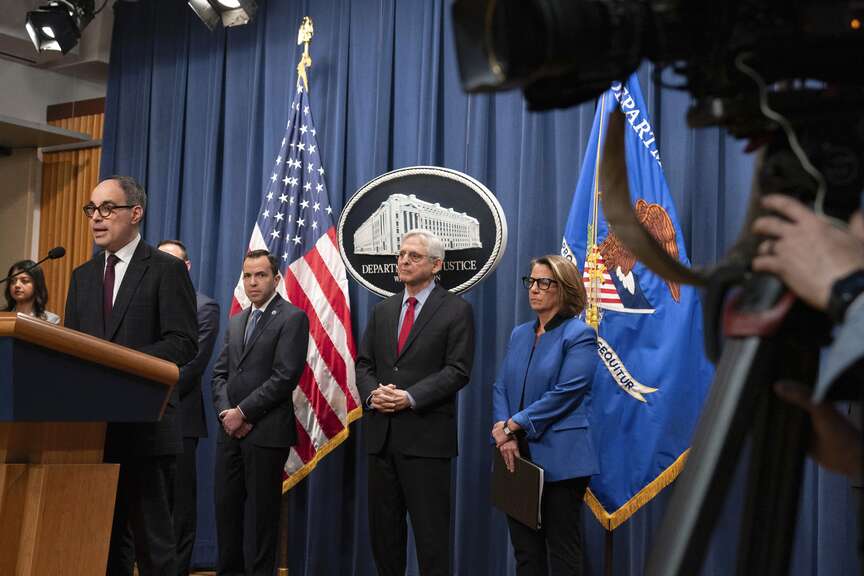 Assistant Attorney General Jonathan Kanter, of the Antitrust Division, from second left, speaks as New Jersey Attorney General Matthew Platkin, Attorney General Merrick Garland and Deputy Attorney General Lisa Monaco, listen during a news conference on antitrust complaint agains Apple at Department of Justice headquarters in Washington, Thursday, March 21, 2024. The Justice Department on Thursday announced a sweeping antitrust lawsuit against Apple, accusing the tech giant of engineering an illegal monopoly in smartphones that boxes out competitors and stifles innovation. (AP Photo/Jose Luis Magana)
Assistant Attorney General Jonathan Kanter, of the Antitrust Division, from second left, speaks as New Jersey Attorney General Matthew Platkin, Attorney General Merrick Garland and Deputy Attorney General Lisa Monaco, listen during a news conference on antitrust complaint agains Apple at Department of Justice headquarters in Washington, Thursday, March 21, 2024. The Justice Department on Thursday announced a sweeping antitrust lawsuit against Apple, accusing the tech giant of engineering an illegal monopoly in smartphones that boxes out competitors and stifles innovation. (AP Photo/Jose Luis Magana)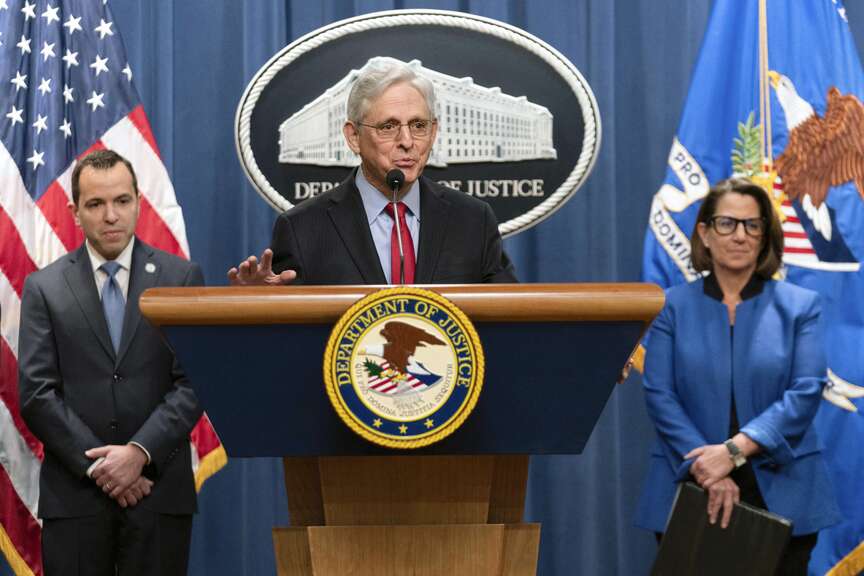 Attorney General Merrick Garland accompanied by New Jersey Attorney General Matthew Platkin and Deputy Attorney General Lisa Monaco, speaks during a news conference at the Department of Justice headquarters in Washington, Thursday, March 21, 2024. The Justice Department on Thursday announced a sweeping antitrust lawsuit against Apple, accusing the tech giant of engineering an illegal monopoly in smartphones that boxes out competitors and stifles innovation. (AP Photo/Jose Luis Magana)
Attorney General Merrick Garland accompanied by New Jersey Attorney General Matthew Platkin and Deputy Attorney General Lisa Monaco, speaks during a news conference at the Department of Justice headquarters in Washington, Thursday, March 21, 2024. The Justice Department on Thursday announced a sweeping antitrust lawsuit against Apple, accusing the tech giant of engineering an illegal monopoly in smartphones that boxes out competitors and stifles innovation. (AP Photo/Jose Luis Magana)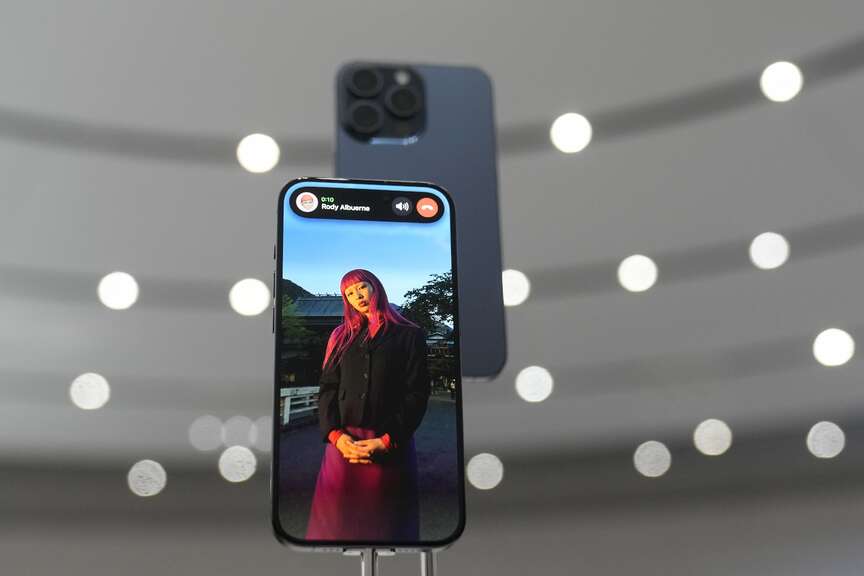 FILE - iPhone 15 Pro phones are shown during an announcement of new products on the Apple campus in Cupertino, Calif., Sept. 12, 2023. The Justice Department announced a sweeping antitrust lawsuit Thursday, March 24, 2024 against Apple, accusing the tech giant of having an illegal monopoly over smartphones in the U.S. (AP Photo/Jeff Chiu, File)
FILE - iPhone 15 Pro phones are shown during an announcement of new products on the Apple campus in Cupertino, Calif., Sept. 12, 2023. The Justice Department announced a sweeping antitrust lawsuit Thursday, March 24, 2024 against Apple, accusing the tech giant of having an illegal monopoly over smartphones in the U.S. (AP Photo/Jeff Chiu, File)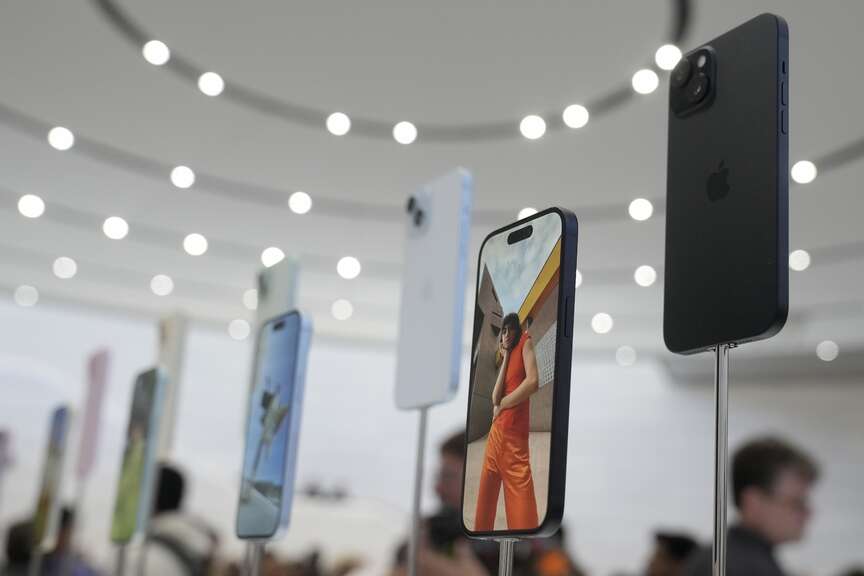 FILE - iPhone 15 phones are shown during an announcement of new products on the Apple campus in Cupertino, Calif., Sept. 12, 2023. The Justice Department announced a sweeping antitrust lawsuit Thursday, March 21, 2024 against Apple, accusing the tech giant of having an illegal monopoly over smartphones in the U.S. (AP Photo/Jeff Chiu, File)
FILE - iPhone 15 phones are shown during an announcement of new products on the Apple campus in Cupertino, Calif., Sept. 12, 2023. The Justice Department announced a sweeping antitrust lawsuit Thursday, March 21, 2024 against Apple, accusing the tech giant of having an illegal monopoly over smartphones in the U.S. (AP Photo/Jeff Chiu, File)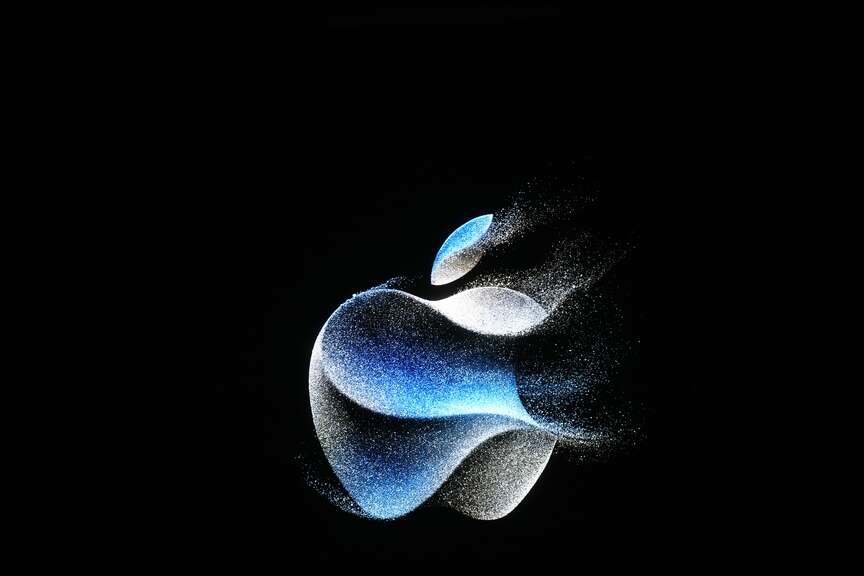 FILE - The Apple logo is shown on a screen during an announcement on the Apple campus Sept. 12, 2023, in Cupertino, Calif. The Justice Department announced a sweeping antitrust lawsuit Thursday, March 21, 2024 against Apple, accusing the tech giant of having an illegal monopoly over smartphones in the U.S. (AP Photo/Jeff Chiu, File)
FILE - The Apple logo is shown on a screen during an announcement on the Apple campus Sept. 12, 2023, in Cupertino, Calif. The Justice Department announced a sweeping antitrust lawsuit Thursday, March 21, 2024 against Apple, accusing the tech giant of having an illegal monopoly over smartphones in the U.S. (AP Photo/Jeff Chiu, File)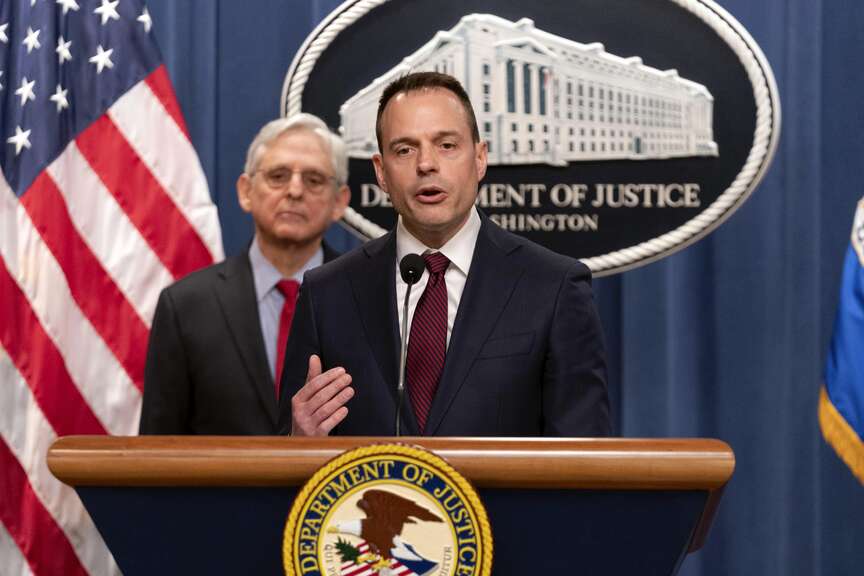 Acting Associate Attorney General Benjamin Mizer, speaks as Attorney General Merrick Garland listens during a news conference at Department of Justice headquarters in Washington, Thursday, March 21, 2024. The Justice Department on Thursday announced a sweeping antitrust lawsuit against Apple, accusing the tech giant of engineering an illegal monopoly in smartphones that boxes out competitors and stifles innovation. (AP Photo/Jose Luis Magana)
Acting Associate Attorney General Benjamin Mizer, speaks as Attorney General Merrick Garland listens during a news conference at Department of Justice headquarters in Washington, Thursday, March 21, 2024. The Justice Department on Thursday announced a sweeping antitrust lawsuit against Apple, accusing the tech giant of engineering an illegal monopoly in smartphones that boxes out competitors and stifles innovation. (AP Photo/Jose Luis Magana)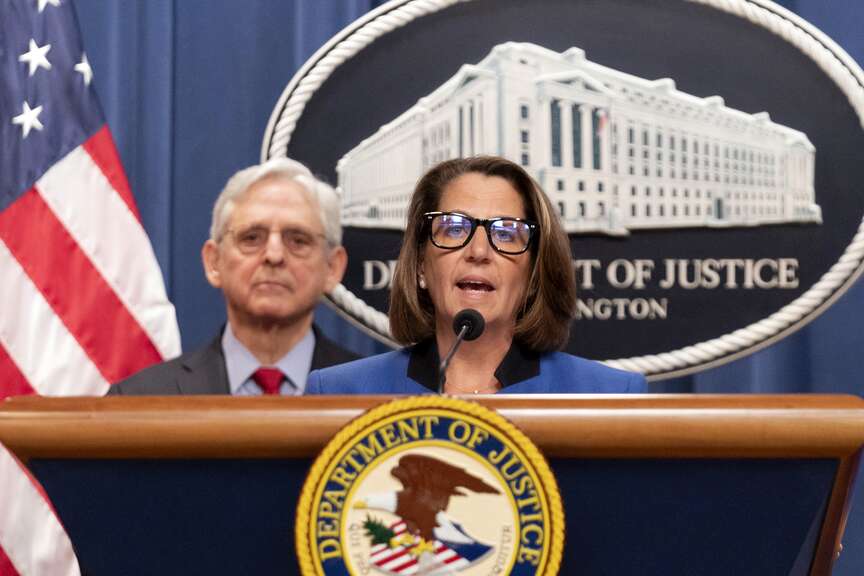 Deputy Attorney General Lisa Monaco speaks as Attorney General Merrick Garland listens during a news conference at Department of Justice headquarters in Washington, Thursday, March 21, 2024. The Justice Department on Thursday announced a sweeping antitrust lawsuit against Apple, accusing the tech giant of engineering an illegal monopoly in smartphones that boxes out competitors and stifles innovation. (AP Photo/Jose Luis Magana)
Deputy Attorney General Lisa Monaco speaks as Attorney General Merrick Garland listens during a news conference at Department of Justice headquarters in Washington, Thursday, March 21, 2024. The Justice Department on Thursday announced a sweeping antitrust lawsuit against Apple, accusing the tech giant of engineering an illegal monopoly in smartphones that boxes out competitors and stifles innovation. (AP Photo/Jose Luis Magana)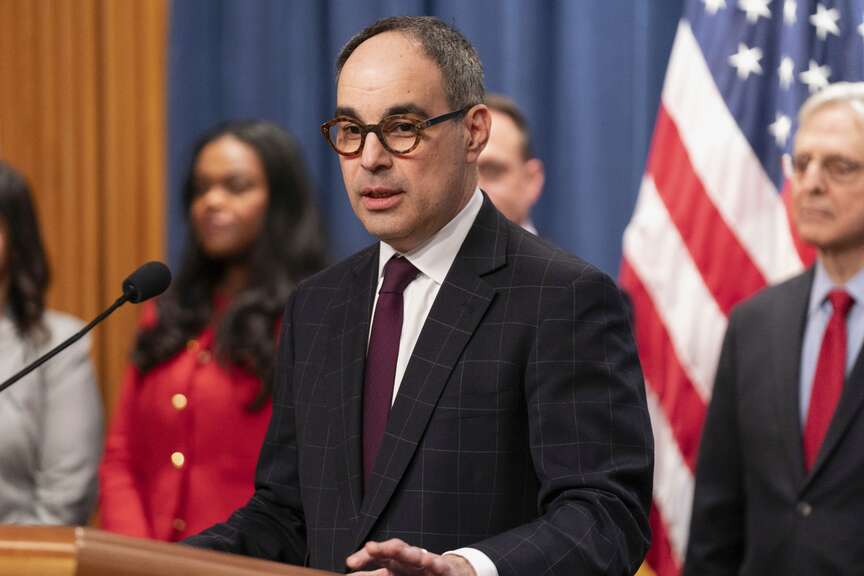 Assistant Attorney General Jonathan Kanter, of the Antitrust Division, speaks during a news conference at Department of Justice headquarters in Washington, Thursday, March 21, 2024. The Justice Department on Thursday announced a sweeping antitrust lawsuit against Apple, accusing the tech giant of engineering an illegal monopoly in smartphones that boxes out competitors and stifles innovation. (AP Photo/Jose Luis Magana)
Assistant Attorney General Jonathan Kanter, of the Antitrust Division, speaks during a news conference at Department of Justice headquarters in Washington, Thursday, March 21, 2024. The Justice Department on Thursday announced a sweeping antitrust lawsuit against Apple, accusing the tech giant of engineering an illegal monopoly in smartphones that boxes out competitors and stifles innovation. (AP Photo/Jose Luis Magana)